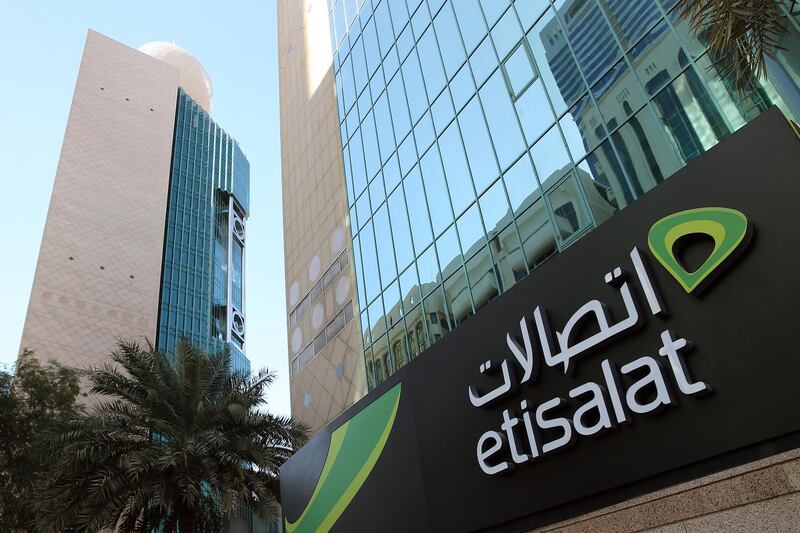Etisalat, the UAE’s biggest telecom operator, said on Tuesday its first quarter net profit remained flat at Dh2.1 billion after federal royalty, missing analysts’ estimates, as it suffered from higher depreciation charges and taxation among other reasons.
Two analysts polled by Bloomberg had forecast an average net profit of Dh2.235bn.
Revenue grew 5 per cent to Dh13.1bn, with UAE revenue rising 3 per cent to Dh7.8bn, it said in a statement to the Abu Dhabi Securities Exchange where its shares are traded. International revenue rose 11 per cent to Dh52.bn, accounting for 40 per cent of total revenue.
The company's share of results of associates and joint ventures fell by 58 per cent to Dh20.6bn from a year-earlier, mostly related to discontinued operations in Nigeria. Impairments and other losses rose to Dh3.35bn from Dh666 million.
“The first-quarter net profit is negatively impacted by higher depreciation charges, lower net finance and other income, higher taxation and minority interest,” it said.
Etisalat, which owns and operates subsidiaries in the Middle East, Africa and Asia, said its global subscriber base increased 3 per cent to 144 million, while in the UAE the number of its customers rose 3 per cent to 12.9 million.
The first quarter net profit results were in line with estimates from Bahrain's Sico.
"The UAE was a bit weaker than our estimate on the EBITDA level on some elevated costs, which was offset by a strong performance from the international segment, particularly Maroc telecom," said Nishit Lakhotia, head of research at Sico.
________________
Read more:
[ Japan's Softbank, Etisalat and two other telcos to form cybersecurity alliance ]
[ Etisalat slashes roaming rates for data, texts and calls ]
________________
“Etisalat has continued its efforts to align its business with its digital initiatives which has enabled us to develop a healthy business portfolio,” said chief executive Saleh Al Abdooli. “We will continue to push technological boundaries and tap on non-traditional revenue streams that will augment our core services revenues and maximise the return on investment of our networks and platforms.”
The company’s operating costs increased 7 per cent to Dh8.5bn due to higher cost of sales, higher depreciation and amortisation expenses, higher network costs, and other expenses. Depreciation and amortisation increased 2.3 per cent to Dh1.8bn from Dh1.76bn a year earlier.
The federal royalty amount paid in the first quarter fell 6 per cent to Dh1.56bn from Dh1.66bn a year earlier.






